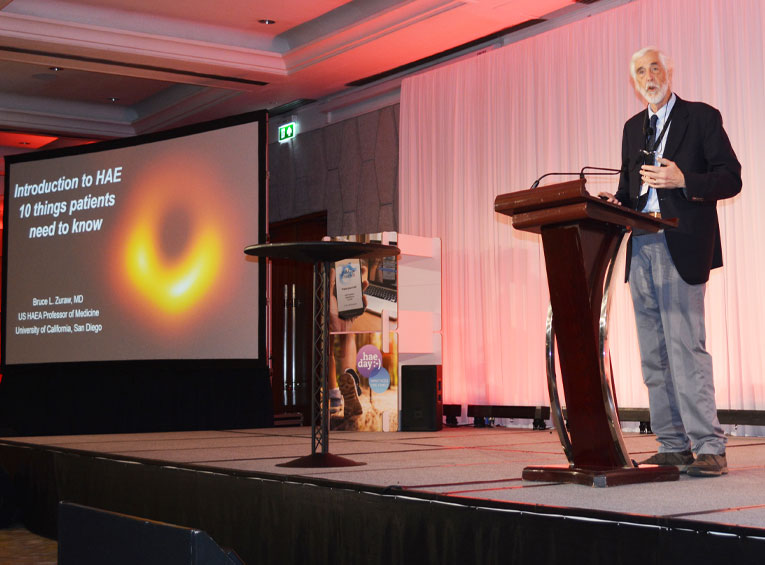This article is taken from an extensive feature on the 2023 HAEi Regional Conference APAC, published in Global Perspectives #1 2023
Plenary Session with All Participants
After lunch on Saturday, all conference attendees gathered for a talk by Prof. Bruce L. Zuraw, Director of the University of California San Diego, United States. Professor Zuraw addressed Ten Important Questions Often Asked About HAE:
1. Why me?
HAE is a genetic condition, and in most cases, one of your parents has a mutation that causes HAE. There are patients with HAE that have no family history. This group had a spontaneous gene mutation that causes HAE at conception and can pass the condition to their offspring.
2. Am I in Danger?
Untreated patients have about two attacks per month, but swelling can occur more or less frequently. Swelling affecting the airway can be fatal if not appropriately treated. Abdominal attacks are painful and debilitating. Untreated HAE has a significantly negative effect on the patients’ lives, affecting school, work, and social activities. HAE can cause a significant psychological burden.
3. What about my Family?
Many HAE patients have family members who have died from laryngeal swellings. Proper diagnosis is critical for effective management. All family members should be tested for HAE.
4. What Causes Attacks?
A complex biological process in the blood that ultimately causes the production of bradykinin – a peptide that causes the capillaries to leak fluid into body tissues. Triggers include stress, physical trauma, surgical procedures, infections, medications such as a blood pressure medicine called ACE inhibitors, and estrogen used in women for birth control and hormone replacement therapy related to menopause.
5. Can I Treat Attacks?
There is a variety of effective treatments approved for treating HAE attacks, and they include C1 inhibitor IV injections (recombinant and plasma-derived) and icatibant. Attacks affecting the airway are emergencies requiring immediate medical care to provide treatment and protect the airway. It is crucial everyone knows that antihistamines, corticosteroids (such as prednisone), and epinephrine do not work and should not be used to treat HAE attacks.
6. Can I Prevent Attacks?
There are a variety of therapies to prevent HAE attacks. First-line therapies include Plasma-derived C1 inhibitor concentrate that can be injected subcutaneously or IV. Lanadelumab is a kallikrein inhibitor delivered by subcutaneous injection, and berotralstat is another kallikrein inhibitor in pill form. Second-line therapies include androgens (danazol) and antifibrinolytics (tranexamic acid). There is no formula for who should be prescribed preventative treatment. The decision must be individualized based on improving the quality of life.
7. How Do I Find a Doctor?
Very few doctors are HAE experts. You want a doctor who is willing to learn about HAE, work with an HAE expert, and develop a patient-physician partnership with you that includes shared decision-making. Every patient should have an HAE management plan that includes extensive patient education and consideration of all treatment options, coordination of care, and treatment logistics.
8. What if I get pregnant?
HAE does not affect fertility nor cause spontaneous abortion or negative pregnancy outcomes. The impact of pregnancy on HAE is highly variable – attacks may increase, decrease, or stay the same. Attacks are very rare during delivery but may increase in the weeks following delivery. Depression is not uncommon after delivery. C1 Inhibitor is the medication of choice during pregnancy.
9. Will My Life Ever Be Normal?
The goal of HAE treatment is to allow leading a normal life free from symptoms and medicine-related side effects. Reaching this goal requires a team effort between the doctor and patient that includes education and a treatment and action plan. Eight treatments are approved by regulatory authorities, and the future looks bright with nine potential therapies in various stages of clinical trials.
10. Who Can I Turn to for Help?
HAEi works every day to make sure your voice is heard. Building networks of physicians and patient organizations is key, as is the further development of clinical registries and research consortiums.
Find more feature articles from the 2023 HAEi Regional Conference APAC:











